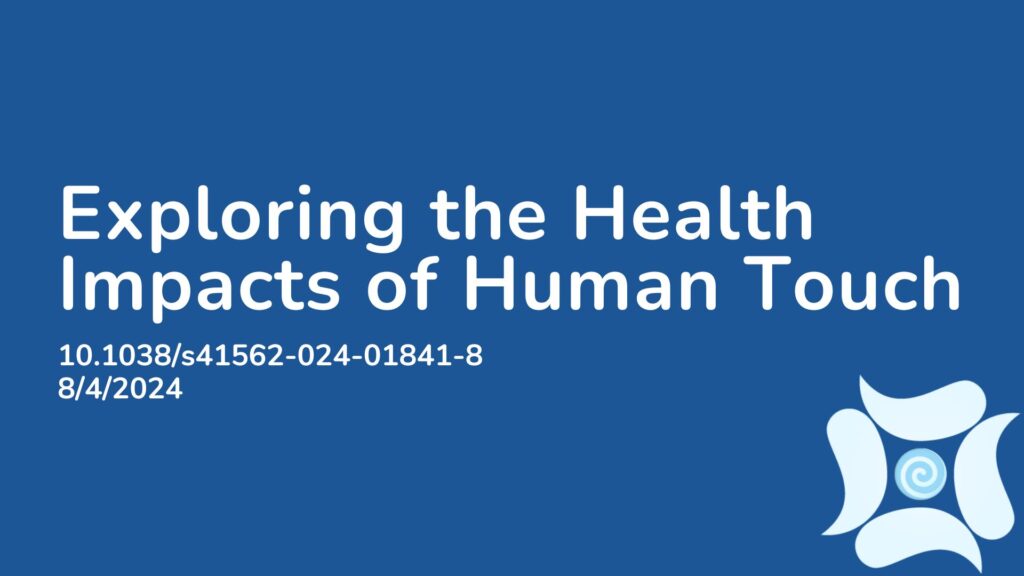Summary:
The sense of touch holds immense significance in various aspects of our lives. It is the earliest sense to develop in newborns and serves as our most direct interaction with the physical and social environment. In addition to our own tactile experiences, we regularly receive touch from others through gestures such as hugs. The recent COVID-19 pandemic has highlighted the importance of understanding the effects of touch, especially with the reduction in social contact due to social distancing measures. Touch interventions have demonstrated numerous mental and physical health benefits, from supporting growth and development to alleviating anxiety and stress, across different age groups. This study is a large-scale systematic review of the effects of touch interventions on physical and mental health. It conducted separate analyses for newborns and children/adults due to differing health outcomes. Touch interventions showed notable effects on various health outcomes across different age groups. In newborns, they regulated cortisol levels and promoted weight gain. For adults, they resulted in reductions in pain, depression, and anxiety levels. Interestingly, no significant difference was found in health benefits between touch provided by familiar individuals versus healthcare professionals in adults, while parental touch was more beneficial for newborns. In conclusion, the authors provided clear evidence that touch interventions are robustly beneficial for both physical and mental health outcomes and at all ages.
Abstract:
Receiving touch is of critical importance, as many studies have shown that touch promotes mental and physical well-being. We conducted a pre-registered (PROSPERO: CRD42022304281) systematic review and multilevel meta-analysis encompassing 137 studies in the meta-analysis and 75 additional studies in the systematic review (n = 12,966 individuals, search via Google Scholar, PubMed and Web of Science until 1 October 2022) to identify critical factors moderating touch intervention efficacy. Included studies always featured a touch versus no touch control intervention with diverse health outcomes as dependent variables. Risk of bias was assessed via small study, randomization, sequencing, performance and attrition bias. Touch interventions were especially effective in regulating cortisol levels (Hedges’ g = 0.78, 95% confidence interval (CI) 0.24 to 1.31) and increasing weight (0.65, 95% CI 0.37 to 0.94) in newborns as well as in reducing pain (0.69, 95% CI 0.48 to 0.89), feelings of depression (0.59, 95% CI 0.40 to 0.78) and state (0.64, 95% CI 0.44 to 0.84) or trait anxiety (0.59, 95% CI 0.40 to 0.77) for adults. Comparing touch interventions involving objects or robots resulted in similar physical (0.56, 95% CI 0.24 to 0.88 versus 0.51, 95% CI 0.38 to 0.64) but lower mental health benefits (0.34, 95% CI 0.19 to 0.49 versus 0.58, 95% CI 0.43 to 0.73). Adult clinical cohorts profited more strongly in mental health domains compared with healthy individuals (0.63, 95% CI 0.46 to 0.80 versus 0.37, 95% CI 0.20 to 0.55). We found no difference in health benefits in adults when comparing touch applied by a familiar person or a health care professional (0.51, 95% CI 0.29 to 0.73 versus 0.50, 95% CI 0.38 to 0.61), but parental touch was more beneficial in newborns (0.69, 95% CI 0.50 to 0.88 versus 0.39, 95% CI 0.18 to 0.61). Small but significant small study bias and the impossibility to blind experimental conditions need to be considered. Leveraging factors that influence touch intervention efficacy will help maximize the benefits of future interventions and focus research in this field.
Article Publication Date: 8/4/2024
DOI: 10.1038/s41562-024-01841-8



